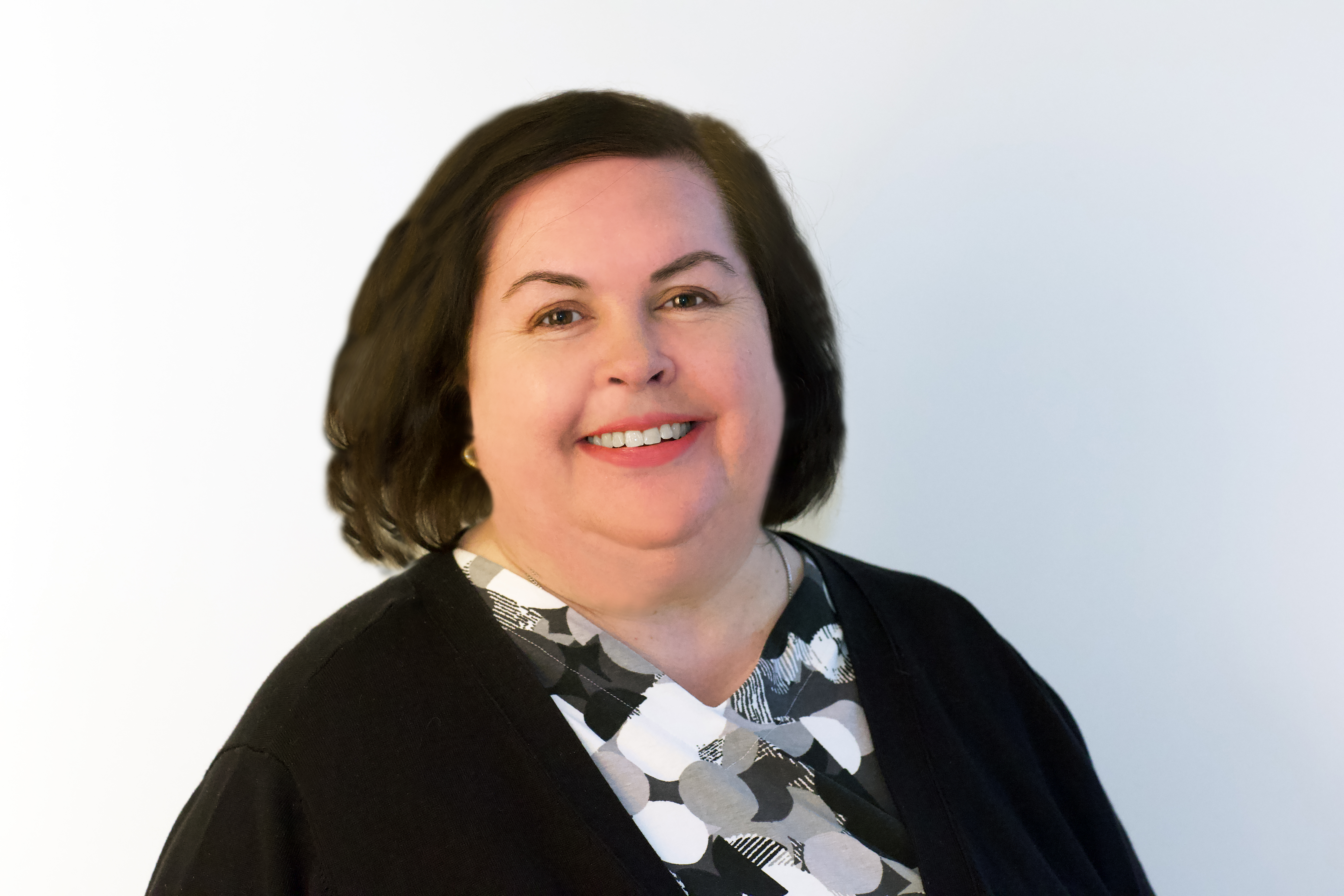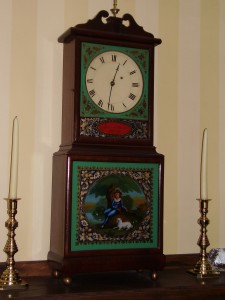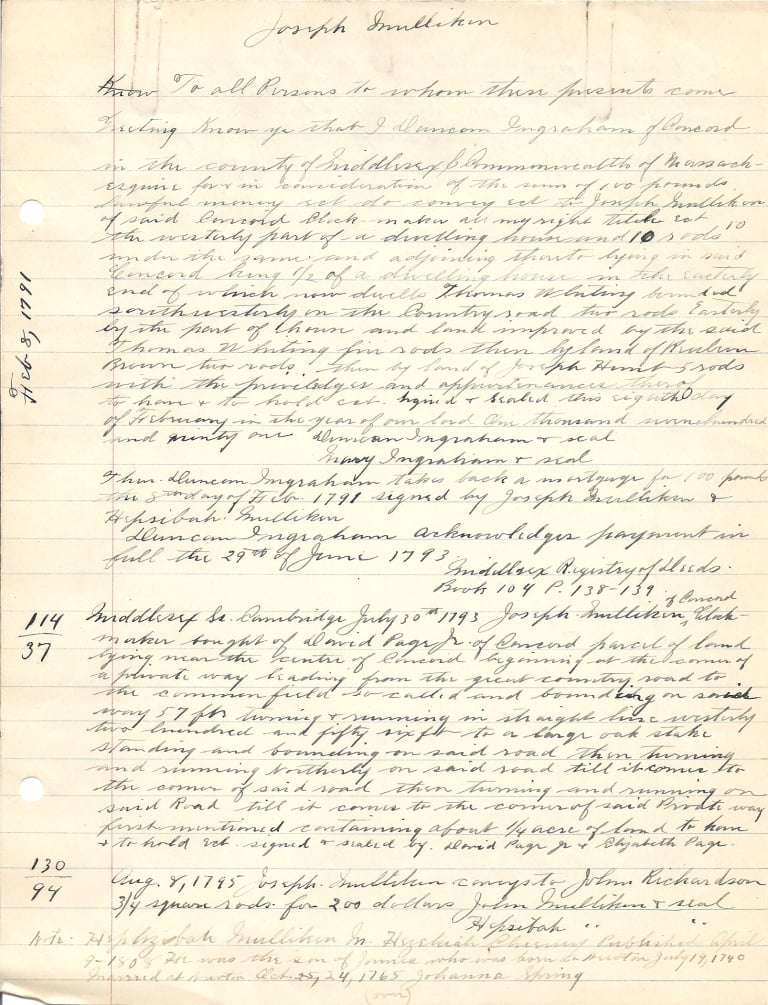One of my favorite family history projects has been organizing the papers of my great-grandfather, James Edward Conlon (1880–1948). He worked in Boston as an antiques dealer and clock maker/restorer from the 1910s through the 1940s. James and his wife Mary had eleven children, including my grandfather John Francis Conlon (1911–1965). My grandfather worked as a firefighter, but in his spare time he painted a number of his father’s clocks, utilizing techniques such as reverse painting on glass and gold leafing. When I began to look through my great-grandfather’s papers, I was surprised to discover a connection to my line of work as a researcher that I didn’t know existed.
As I sorted through his materials, I located items such as photographs of clocks, drawings of clock works, and magazine articles on clock making. However, the documents that interested me the most were the detailed hand-written genealogies my great-grandfather wrote on a number of early New England clockmakers, including the Mulliken family, Simon Willard, and Benjamin Bagnall. Although a number of people in my family enjoy hearing about my latest family history discovery (or at least I tell myself that they do), I am the only one in my family who conducts genealogical research. I felt connected to my great-grandfather as I leafed through his pages of notes, appreciating how time-consuming a task this was for him, especially without research tools such as searchable databases and digital collections. He transcribed land and probate records, genealogies, and a number of marriage and death notices published in early New England newspapers. And as a researcher, I was excited to see that he even wrote down the sources he used for his research.
James Conlon gave lectures on the history of New England clock making at a number of local historical societies. Hand-written copies of these lectures are included with his personal papers. One particular item of interest is the lecture he gave at the 27 October 1934 meeting of the Boston Clock Club titled “Benjamin Bagnall and his Clocks.” I located a copy of the Club’s meeting minutes for this date, which describes James Conlon as someone who “has long been engaged as a clock maker and probably has had a broader experience with fine clocks than any other person in this section. In addition to his practical experience, he has in years past devoted a great deal of time and energy to consideration of the origin and history of New England clock makers.” Since the topic of this meeting was Benjamin Bagnall, also recorded in the meeting minutes was a list of institutions and individuals who owned Benjamin Bagnall Tall Clocks, including the New England Historic Genealogical Society and my great-grandfather. Photographs of these clocks were displayed at this meeting, including two photographs of the Tall Clock owned by NEHGS. This clock was made by Benjamin Bagnall in 1725, and was given to the Society by Martha Wheelright in 1867.
I have walked by this clock on a number of occasions at work, so it was interesting to read about its inclusion in the Benjamin Bagnall presentation. I’m really glad I had the chance to work on this project, since it provided me with a unique opportunity to learn more about my great-grandfather and his profession.
Share this:

About Eileen Pironti
Eileen writes family histories as part of the Learning & Interpretation team. Under the Newbury Street Press imprint, she has authored several books, including Ancestral Lines of Iain W. F. Shepherd and Helen Waugh (Gray) Shepherd – Journeys in Time. She has written articles for American Ancestors magazine, and contributes to the Vita Brevis blog. Among Eileen’s interests is Irish research. She frequently lectures on this topic for our Education department through online conferences and webinars, and provides consultations to patrons at various research events. Eileen also gives lectures on lesser-utilized resources such as bank records, providing strategies for thinking “outside the box” when conducting research. Eileen’s love of history extends beyond her work as a member of the American Ancestors staff. Since 2015, she and her husband Paul have been live-in caretakers of the William Clapp House in Dorchester, Massachusetts, one of three historic homes owned by the Dorchester Historical Society. In 2019, Eileen wrote “In Her Own Words: The Life of Elizabeth (Clapp) Withington (1816-1845),” an article about a member of the Clapp family, for American Ancestors magazine. Eileen earned a BA in English from Saint Anselm College, and an MS in Justice, Law, and Society from American University.View all posts by Eileen Pironti →

